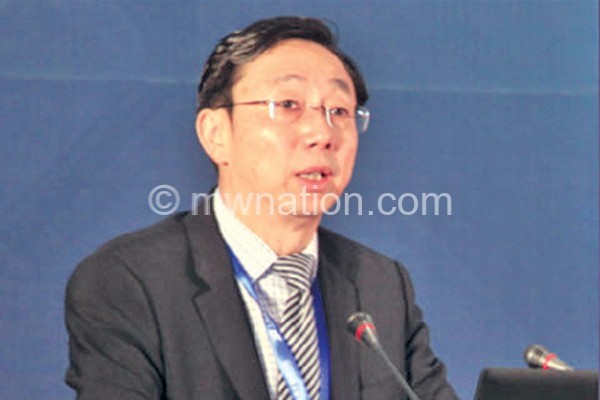‘Economy is improving, more needs to be done’
International Monetary Fund (IMF) deputy managing director Tao Zhang is in the country gain more knowledge about the progress and the policies needed to deal with the challenges the country is facing. During his five-day visit, he is expected to meet President Peter Mutharika, policymakers, business leaders, legislators and representatives of civil society. Our Business Reporter GRACE PHIRI engages Zhang on his visit and other issues.

What is the purpose of your visit to Malawi?
I am looking forward to this visit – my first ever to Malawi since joining the IMF. Malawi has taken important steps to sustain its economic growth rates over the last decade, and I would like to gain more knowledge about the progress and the policies needed to deal with the challenges the country is facing. For this momentum to be translated into improved living standards for all Malawians, macro-economic stability needs to be maintained along with a more business-friendly environment. The presence of stronger institutions and continued anti-corruption efforts will also be crucial to renewing investor confidence in the country
Poverty is still a key challenge and the economy remains undiversified and vulnerable to external shocks. As such, there are several important issues I wish to engage on during my visit. What is Malawi’s plan for macro-economic stability? How can it address issues such as poverty, inequality and climate-related risks? There is also the challenge of having to come up with the necessary funds required for spending on key issues such as infrastructure, agricultural production and healthcare to drive growth and improve people’s welfare.
I look forward to engaging with President Peter Mutharika, policymakers, business leaders, legislators and representatives of civil society. I am happy to share the IMF’s views, but first and foremost, I am here to listen.
What is the status of IMF relations with Malawi?
Malawi has had a series of programmes with the IMF for the past 20 years—the latest of which is an Extended Credit Facility that has been in place since 2012. This programme provides concessional financing (at zero percent interest) aimed at supporting low-income countries’ efforts to achieve macroeconomic stability that can deliver sustained growth and poverty reduction. During the program, there has been some progress related to monetary and financial sector reforms, as well as improvements in the country’s external position as reflected in the increased availability of foreign exchange since 2012. The programme has in our view enabled Malawi to pursue macro-economic stability.
We also engage with Malawi through our work on technical assistance and training in support of reforms aimed at improving economic performance and efficiency. This includes visits by teams from IMF headquarters and our Regional Technical Assistance Centre in Dar es Salaam, East Africa, as well as participation by Tanzanian officials in training courses in Washington and at our Africa Training Institute in Mauritius. Some of the areas in which we have provided this type of support include public finance management, monetary policy analysis, tax policy and revenue administration.
What are your economic projections for Malawi?
Malawi is a stable country that is blessed with many natural resources and a young labour force. The resilience of the people in this country has most recently been witnessed through the collective efforts taken to deal with the humanitarian crisis brought about by the drought. We are expecting Malawi’s growth to rise from below 3 percent in 2016 to between four and five percent in 2017. The drought’s impact on agriculture pushed growth to lower than expected levels but we are now seeing improvements, thanks to a rebound in sectors such as agricultural production and telecoms, as well as increased wholesale and retail trade. The Government has made efforts to stabilise the economy and brought inflation down from 25 percent in 2015 to 14.6 percent in April 2017—its lowest level in recent years.
Despite increased public spending on health and education, various sources of data appear to suggest that most Malawians are still living in extreme poverty. What can Malawi do to get its people out of poverty?
Food insecurity, climate change, creating jobs and providing social services such as health and education—are all key issues that are being faced by the country. The challenge is to secure the progress made in recent years while pushing for more inclusive and sustainable growth. It is important for Malawi to accelerate its economic growth rate above that of the population (three percent) to put a dent into poverty. Social safeguards will also be needed to ensure that adequate spending is allocated to the poor for access to public goods and services. At the same time, the budget will need to set priorities and address key infrastructure bottlenecks to growth such as electricity shortages, and high transportation costs. In addition, there is scope to make growth more inclusive in Malawi by facilitating job creation, promoting financial inclusion and raising productivity in agriculture, where most of the population is employed. These are all areas where the government has an important role to play.
Over the years, Malawi has lost donor confidence and direct budget support due to corruption and financial mismanagement. Any advice on how this can be turned around?
Continued efforts to address corruption would help strengthen investor confidence and economic prospects. It is in this regard that the IMF’s engagements on technical assistance and training have focused on a back-to-basics approach to regularising fiscal reporting through bank reconciliations, better cash and debt management, and greater transparency in publishing budget execution. You might recall that weaknesses in these areas have in the past led to the loss of public funds. As such, we welcome the ongoing strengthening of public financial management systems, which is expected to restore trust and confidence in the budget process and the broader approach to the allocation of resources.





